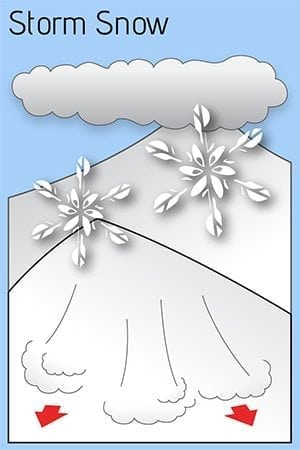Valdez
Above 4,000ftConsiderable
2,000 to 4,000ftConsiderable
Below 2,000ftConsiderable
Degrees of Avalanche Danger
Avalanche Problems
Problem 1
Today will mark the tail end of a significant series of storms that began on 11/8. Over 50 inches of snow has been recorded at Thompson Pass DOT along with rising temperatures. Precipitation is just beginning to trail off this morning with temperatures remaining elevated as of 6am. Expect to find widespread areas of unstable snow on slopes steeper than 32°. Moderate southerly winds during the storm will have redistributed new snow in wind exposed areas creating deeper slabs on lee aspects. Human triggered storm slab avalanches up to 3 feet in depth will be likely during the next 24 hours. Temperatures are forecasted to decrease today which will allow our snowpack to settle increasing stability as temperatures fall, but this process takes time. If you get out into the mountains today, patience and conservative terrain choices are recommended.
Likelihood:
- Almost Certain
- Very Likely
- Likely
- Possible
- Unlikely
Size:
- Historic
- Very Large
- Large
- Small
Trend
- Increasing
- Steady
- Decreasing
Weather
Point forecast for:Thompson Pass Mid Elevation (2000-4000')
Date Monday 11/14/22 Tuesday 11/15/22 Time (LT) 06 12 18 00 06 12 18 00 06 Cloud Cover OV BK SC SC SC SC SC FW FW Cloud Cover (%) 90 60 30 30 35 45 45 20 15 Temperature 32 32 27 21 20 22 18 16 20 Max/Min Temp 33 19 22 15 Wind Dir SW S NE NE NE NE NE NE NE Wind (mph) 21 9 4 10 14 16 12 8 5 Wind Gust (mph) 39 Precip Prob (%) 80 30 0 0 0 0 5 10 0 Precip Type S S 12 Hour QPF 0.07 0.00 0.00 0.00 12 Hour Snow 0.6 0.0 0.0 0.0 Snow Level (kft) 1.6 1.4 0.4 0.1 0.1 0.0 0.0 0.3 1.3
Additional Information
Our snow season began with above average precipitation and temperatures. Beginning in September, snow lines generally hung around 4500′ until 10/12. At that point our area received the first snow down to sea level with 12-16 inches on the north side of Thompson Pass.
On 10/15 wet conditions continued with the freezing line rising to 5000′ or higher. As skies finally cleared on 10/22 we were left with a thin rain saturated snowpack capped by a stout rain crust up to 4500′. Above 4500′ much deeper snowpacks existed due to significant early season snowfall at upper elevations.
Dry and cold conditions along with moderate outflow winds finished out the month of October.
On 11/1 precipitation returned with 18 inches of snow and ~1″ of SWE on Thompson Pass. This new snow was initially reactive with several natural D2 avalanches reported on Thompson Pass. These slides were running on a firm bed surface consisting of old rain crusts and old wind slabs from October.
On 11/4 a strong north wind event kicked up with 65 mph+ winds on Thompson Pass. Our snowpack received significant damage as already thin snow below 4500′ was stripped down to old wind slabs, rain crusts and the ground.
Precipitation returned on 11/8 and became heavy on 11/11. Storm totals of around 50 inches were recorded at Thompson Pass DOT between 11/8-11/13. Snow lines rose to ~3000′ near the tail end of the storm with heavy rain occurring in low lying areas.
Announcements
The avalanche hazard is CONSIDERABLE. Thompson Pass has received 3 feet of new snow in the last 72 hours at road level. The snowpack will need time to adjust to this new weight. In the meantime, human triggered avalanches up to 3 feet in depth will be likely and natural avalanches are possible.
Click the (Full forecast +) button below for additional information. Consistent avalanche forecasts will begin December 1st.
